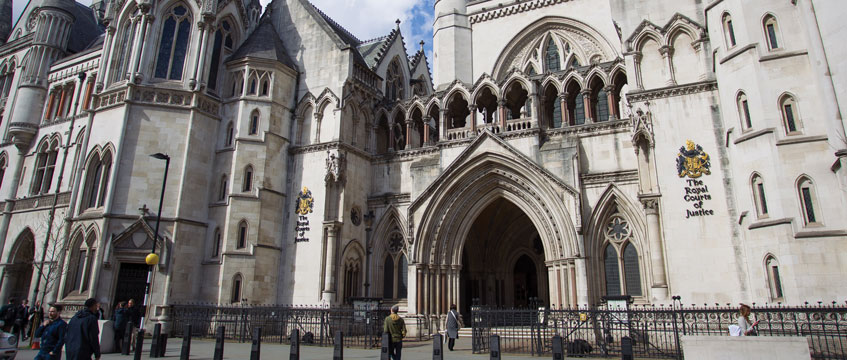The Court of Appeal ruled today that a large London commercial property that was occupied by property guardians for three years may have to pay more than £4.2m in business rates for the period.
The ruling is a blow to property owners who have been using property guardian schemes as a means of avoiding paying business rates on otherwise empty properties.
The case involves Ludgate House at the southern end of Blackfriars Bridge in Southwark, SE1. Until its demolition in 2018, the building – formerly the home of Express Newspapers – was occupied between July 2015 and May 2017 by a number of property guardians.
The ruling could have widespread impact on properties across the country, particularly at a time when Covid-19 has seen greater numbers of premises standing vacant.
As a result of the presence of property guardians, the Upper Tribunal (Lands Chamber) found that the owner of Ludgate House was not liable to pay non-domestic rates for the property – which had a rateable value of almost £4.2m – during that period.
However, the London Borough of Southwark, which collects rates on the building, objected and asked the Court of Appeal to overturn that decision. In a ruling handed down today, a three-judge panel agreed, finding that, because of the contract between the guardians and the freeholder, the building remained liable for business rates.
“This is a blow to people seeking affordable accommodation, to owners of empty properties, and last but not least, to the people of Southwark,” said Graham Sievers, chairman of the Property Guardian Providers Association, in an e-mail to EG.
“There are vast swathes of vacant offices, closed retail shops, pubs, churches and libraries across the UK – many millions of square metres left useless whilst awaiting redevelopment or an upturn in the economy,” he said
“Laying empty, they attract vandalism, arson, theft and neglect from weather damage that costs owners and local authorities millions to repair. With a severe housing shortage, the concept of property guardians keeping temporarily vacant properties secure, in return for far lower fees than a tenant pays in rentals, should be encouraged and supported as a force for good.”
The ruling examines the agreement between the property guardians and LHL, the company that owned the freehold.
A property guardian is a private individual who, usually with others, lives in a building to secure it from trespassers. It provides the guardian with cheap accommodation and the building owners security against squatting and, unusually, the possibility of not paying non-domestic rates because it is being used for accommodation. In this case, 46 guardians lived in the building. Each paid £500 a month.
“The main issue in this appeal is whether on 1 July 2015… Ludgate House, Southwark, was a single hereditament for rating purposes,” Lord Justice Lewison, who wrote the judgment, said.
“The Upper Tribunal… held that it was not… In consequence of their decision, it is common ground that Ludgate House was required to be removed from the rating list. The billing authority, Southwark LBC, appeals.”
“The issue turns, in effect, on whether particular rooms in the building were in separate rateable occupation. The UT held that they were.”
To decide, the judges examined the agreement between the guardians and LHL.
Under that agreement, the guardians had various contractual obligations, such as to challenge intruders. And LHL, at no point, even during the occupation of the building, gave up possession of Ludgate House, the judges found. In fact, the contract expressly removed any “general control” over the building from the inhabitants.
As a result, the guardians were more like employees than tenants. The judges ruled that the rooms were not subject to domestic rates, and the property can’t get out of paying business rates.
“This appeal has had a chilling effect on the market for guardian services,” said Roger Cohen, a partner at Bryan Cave Leighton Paisley LLP. “This decision means that winter has set in.
“The Court of Appeal has decided that in seeking to understand the rateability of the premises, the Upper Tribunal should have assessed the rights retained by the building owner who was the ratepayer. Instead, the Upper Tribunal wrongly focused on the rights actually exercised by the owner. As there was no suggestion that the licences granted to the guardians were shams, the Upper Tribunal should have given weight to the control over the living space retained contractually by the owner. Owners of empty buildings will now be looking for other products in order to mitigate their empty rates liabilities,” he said.
“Today’s decision goes straight to the heart of the debate over the future of the workplace,” said Joseph Green, an associate at Charles Russell Speechlys LLP.
“As businesses realised their employees can work efficiently from home and saw the potential benefit from savings on rent, the Covid-19 pandemic saw a prolonged period of mass remote working. This could result in an increasing number of empty office units and landlords looking to rate mitigation schemes to reduce their losses. The London Borough of Southwark’s appeal is an example of a local authority clamping down on the mitigation of business rates.”
He said that there was an expectation that the court might not permit guardianship schemes on the grounds of public policy, but instead the judges closely examined the guardianship arrangement that was in place for this specific property.
“This decision doesn’t spell the end of guardianship schemes which will please both occupiers and landlords after what has been a financially painful year,” he said.
“However, those currently utilising them or planning to will be looking very closely at the terms of their arrangements to make sure they don’t fall foul of this decision.”
Ludgate House Limited v Ricketts (Valuation Officer) & Anor
Appeal
From the Upper Tribunal (Lands Chamber)
Court of Appeal (Lewison LJ, McCombe LJ, Bakder LJ) 3 December 2020
See also: Are property guardians the solution for empty property?








